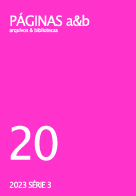AGILIDADE NA CIÊNCIA DA INFORMAÇÃO
um relato de ensino de métodos ágeis para o profissional da informação
Palavras-chave:
Ciência da Informação, Competência em dados, Métodos ágeis, ScrumResumo
Os desafios da gestão de projetos envolvem o reconhecimento de recursos tecnológicos e da competência em dados para o desenvolvimento de produtos e serviços de informação. Este artigo apresenta um relato de ensino de uma disciplina sobre métodos ágeis no contexto da Ciência da Informação. Com abordagem quantitativa e qualitativa, por meio de técnicas de observação e pesquisa documental, a disciplina foi ofertada no Programa de Pós-Graduação em Gestão & Organização do Conhecimento, na Universidade Federal de Minas Gerais, Brasil, no segundo semestre de 2022 e 2023. Para mensurar os resultados foi considerado o desempenho acadêmico e um formulário de avaliação de preenchimento opcional e sem identificação. Como resultados destacam-se os artefatos desenvolvidos para a disciplina com um eixo teórico e outro prático, o preenchimento das vagas, a motivação e interação dos discentes e a apropriação do Scrum, por meio da execução de um projeto no final da disciplina.
Referências
BERRÍO-ZAPATA, C; RODRIGUES, A. C.; GOMES, L. R. G. 2022 Plataformas, plataformização e ecossistemas de software nas bases de dados acadêmicas: aspectos conceituais. [Em linha]. 2019, p. 361-371. [Consult.19 out. 2023]. Disponível em: http://hdl.handle.net/20.500.11959/brapci/125315.
FEDERER, L. 2018 Defining data librarianship: a surveyofcompetencies, skills, and training. Journal of the Medical Library Association. 106:3 (2018) 294-303.
FITZGERALD, M., et al. 2014 Embracing digital technology: a new strategic imperative. MIT sloan management review. 55:2 (2014) 1.
KOLTAY, T. 2019 Accepted and emerging roles of academic libraries in supporting research 2.0. The Journal of Academic Librarianship. 45:2 (2019) 75-80.
PRESSMAN, R. S. 2006 Engenharia de software. 6ª ed. São Paulo: Makron Books, 2006.
RIBEIRO, L. R .C. 2008 Aprendizado baseado em problemas. São Carlos: UFSCAR; Fundação de Apoio Institucional, 2008.
SABBAGH, R. 2013 Scrum: gestão ágil para projetos de sucesso. São Paulo: Casa do Código, 2013.
SCHWABER, K.; SUTHERLAND, J. 2020 The Scrum guide-the definitive guide to scrum: the rules of the game. [Em linha]. 2020. [Consult. 19 out. 2023]. Disponível em: https://scrumguides.org/docs/scrumguide/v2020/2020-Scrum-Guide-PortugueseBR-3.0.pdf.
SANTARÉM SEGUNDO, J. E. 2018 Web semântica: fluxo para publicação de dados abertos e ligados. Informação em Pauta. [Em linha]. 3:nº especial (26 nov. 2018) 117-140. [Consult.19 out. 2023]. Disponível em: http://www.periodicos.ufc.br/informacaoempauta/article/view/39721.
SOMMERVILLE, I. 2011 Engenharia de Software. 9ª ed. São Paulo: Pearson Prentice Hall, 2011.
VALENTE, M. T. 2020 Engenharia de software moderna: princípios e práticas para desenvolvimento de software com produtividade. [Em linha]. Belo Horizonte: Universidade Federal de Minas Gerais, 2020. [Consult. 14 dez. 2023]. Disponível em: http://hdl.handle.net/1843/37905.
Downloads
Publicado
Como Citar
Edição
Secção
Licença
Os autores têm autorização para assumir contratos adicionais separadamente, para distribuição não-exclusiva da versão do trabalho publicada nesta revista (ex.: publicar em repositório institucional ou como capítulo de livro), com reconhecimento de autoria e publicação inicial nesta revista.






